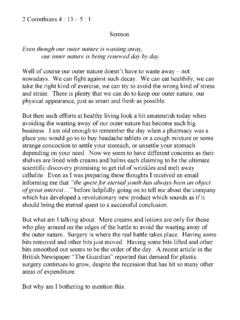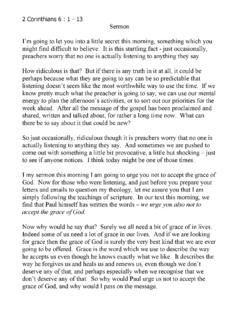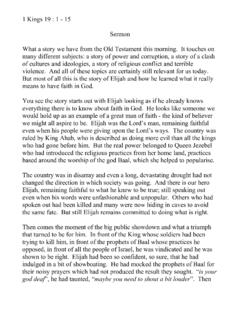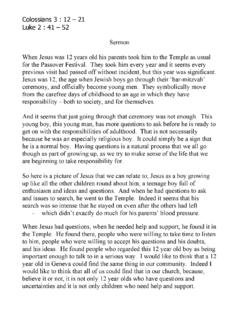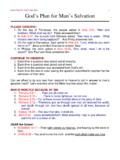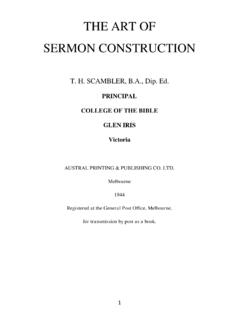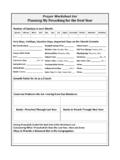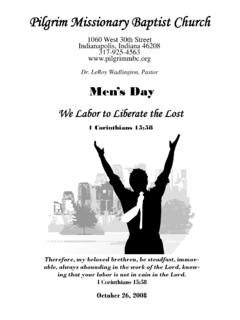Transcription of 14a Mark 6 : 30 34, 53 - 56 Sermon
1 2 Samuel 7 : 1 14a mark 6 : 30 34, 53 - 56 Sermon In an early scene in the movie O Brother Where Art Thou , George Clooney is trying to convince two fellow escaped prisoners to join him in searching for the treasure he claims to have hidden after a robbery. They come across an old blind man who speaks like an Old Testament prophet, muttering things about the need to search for treasure. George Clooney seizes the opportunity and launches into a speech about how they should listen to him because, he explains, people who lose their sight gain other powers, he insists that blind people are known to have great insight and wisdom, that they have a kind of supernatural understanding. The men look impressed, but one of them points out that the old blind man also muttered something about how, even if they search, they would never find the treasure.
2 You shouldn t listen to that, says George Clooney, he s just a silly old blind man - what does he know! It is a classic dilemma that is being described. How can we tell who to listen to, who has real wisdom, whose words should we believe and whose advice should we follow? How do we avoid hearing what we want to hear and nothing else. Perhaps the answer you would expect to hear from me might seem obvious enough. We don t allow our lives to be shaped and directed by the shifting sands of human opinion, but we look to the ancient wisdom of the bible. We don t listen to those who have their own ideas and their own motivation; we look to the inspired wisdom of the bible which has rung true for so many generations before us. That is good teaching and I m happy for you to hear it from me, but I also recognise that life is not always so straightforward.
3 I recognise that even within the bible we do not find a single message with easy answers but we find people struggling to know who to listen to, struggling to work out right from wrong, to decide between good and bad, between bad and worse, between good and better. There are many difficult decisions to be made and it is not always clear who we should listen to and it is hard to avoid simply hearing voices which will confirm what we already want to do anyway. How should I prioritise my time, how should I use my money, what sort of church should we be, where should we focus our energies? They are not just some questions I have dreamed up for the sake of something to talk about this morning. They are very real questions for us, and they are the questions which King David has to struggle with in the part of his story which we read this morning, At this point of his story David is riding the crest of the wave.
4 He is immensely popular among his people. He has established peace and prosperity, so he has the freedom and the time at last to reflect, and to make some decisions which are not driven by the necessities of survival. One thing which he notices and which troubles him is that while his life has moved on so far, while he now lives in great luxury and comfort, the ark of the covenant which represented God s presence was still kept where it had been stored since he first brought it to Jerusalem in a simple shelter. So he has this idea to build a fine temple as a more suitable home for the presence of God. It seems like a good idea but he wants to be sure, so he wisely seeks the advice of someone he can trust. Nathan is described as a prophet but in fact he was an official royal prophet.
5 I suppose we might think of him as the Kings personal chaplain. When David proposed that he build God a house at least as grand as the mansion he was occupying - it seemed like a no brainer. Go ahead, he says, The Lord is with you. David hears what he wants to hear and Nathan improves his career prospects. It seems like such an obviously good thing to do, what could go wrong? Well nothing did go wrong, but only because the Lord intervened to make it clear to Nathan that this might be David s big idea, but it was not his idea. David s plan may have looked innocent, and it is not difficult to see the logic of it or to argue a case for it, but it could well have led him to the kind of arrogant self-sufficiency that could be his undoing. For as is the case throughout this story what matters is not what David can do for God.
6 This is always about what God can do for David. The promise which Nathan is given to pass on to David is spectacular in its scale. It humbles David to hear it, so much that his response was to go and sit before the Lord. That passiveness is significant. No more standing up to tell God what he was going to do for him. It s time to sit and be quiet and humbly receive what God alone can give. It turns out that even spiritually alive people, even those who have a close relationship with God, even they need to be reminded that God is in charge and that our ways are not necessarily his ways. That is a level of wisdom which can be hard for us to hear, but it is the consistent message of the scriptures as much as anything is. Eugene Peterson sums up the point of this passage with these words; God s word to David through Nathan was essentially this: You want to build me a house?
7 Forget it I m going to build you a house. The kingdom that I m shaping here isn t what you do for me but what I do through you. I m doing the building here, not you. I m not going to let you confuse things by launching a building operation of your own. If I let you fill Jerusalem with the sights and sounds of your building program before long everyone will be caught up in what you are doing, and not be attentive to what I am doing. This is a kingdom that we re dealing with, and I am the king. A humble tent could never do for the great God of the universe, not now that the people were living is wealth and comfort. That seems right. That seems like an expression of gratitude. That is human thinking. Yet it seems that God was more interested in building David a house than having it be the other way around.
8 And hard as it must have been to see at the time, there was a kind of logic at work there. In the end it would be the house and line of David that would bring to this world the incarnate Son of God. God did not mind living in a tent. As the Apostle John would one day reveal to the world, when the time had fully come, God would tent among his people yet again (John 1:14) and that it was precisely his willingness to do that which would reunite us with him, and offer salvation to the world. A temple would eventually be constructed and a huge and impressive building it would be. In the end however the presence of God among his people would not be seen in a fine building. Jesus caused great scandal by saying that the temple would be destroyed, that not one stone would be left on top of another.
9 Meanwhile in great humility he himself moved among the poor and the hurting of the world. He started a movement of people who would bring the presence of God to friends and neighbours and even enemies, which is a much more important image of God for us than the grandest of buildings. So let s get back to those How should I prioritise my time, how should I use my money, what sort of church should we be, where should we focus our energies? Whatever answers we might come up with, and whatever answers others might suggest for us, and whatever we might want to hear, if the answers are going to have the effect of making us look good then they may not be part of God s plan. If they are going to make us look good rather than promoting the work of the gospel as seen in Jesus, then they might not be part of God s plan.
10 Jesus calls people to learn from him and he sends people out to do the things he did. This remains a much more important calling on our lives than the grandest of our churches and the most worthy of our projects. The prophetic wisdom which we are offered today suggests that we should be wary of trusting any opinions, even our own. All of us are mixed in our motives, pulled by many drives and attractions which we are barely even aware of. Our choices are always going to influenced by many things besides a desire to do what is right in the eyes of God. That might sound negative, but is in truth a radical humility which can free us to see more clearly than we could otherwise. And in the end the message is immensely positive. The work of God, the doing of what is right, the forgiving of sins and the healing of hurts and the breaking of barriers, is a huge challenge for us, but it does not depend on us.
